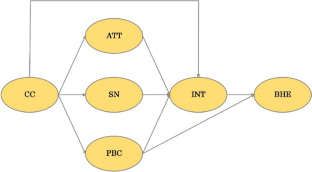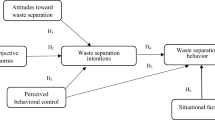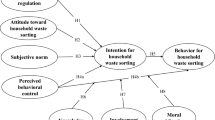Abstract
The increasing amount of household waste has caused harmful environmental pollution and land occupation problems. Implementing separate waste collection is considered an effective waste management method. This study used structural equation modelling (SEM) to investigate the garbage separation behaviour of 657 residents in Beijing. This study investigates the intention of residents to categorise behaviour from a psychological perspective, and previous studies on individual behaviour have overlooked the influence of their environment. Combining external factors of community convenience with the theory of planned behaviour (TPB) enriches research on environmental behaviour. The research results indicate that residents’ attitudes, subjective norms, and perceived behavioral control have a positive and substantial impact on their willingness to participate in garbage classification behaviour. Community convenience as an exogenous variable plays an important role in directly and indirectly influencing personal garbage classification tendencies. The new model constructed has stronger explanatory power than the original model. The study also provides some practical suggestions, such as strengthening the dissemination of classification knowledge, improving residents’ environmental awareness, increasing investment in classification facilities by the government and community, reducing the perceived difficulty of classification behaviour by residents, and creating a convenient atmosphere for garbage recycling and utilisation.





Similar content being viewed by others
Data availability
Data should be provided upon request.
References
Jia F, Yang K, Mei S, Tian S, Huang J, Zhou L (2022) The building of an ecological civilization enters a new era: the situation of and new issues involving environmental protection. In: Chinese research perspectives on society, Vol. 8. Brill, pp. 360–384
Gu B, Wang H, Chen Z et al (2015) Characterization, quantification and management of household solid waste: a case study in china. Resour Conserv Recycl 98:67–75. https://doi.org/10.1016/j.resconrec.2015.03.001
Xiao S, Dong H, Geng Y et al (2020) An overview of the municipal solid waste management modes and innovations in Shanghai, China. Environ Sci Pollut Res 27:29943–29953. https://doi.org/10.1007/s11356-020-09398-5
Zhu Y, Zhang Y, Luo D et al (2021) A review of municipal solid waste in china: characteristics, compositions, influential factors and treatment technologies. Environ Dev Sustain 23:6603–6622. https://doi.org/10.1007/s10668-020-00959-9
Zhang X, Chen X, Zhang X (2018) The impact of exposure to air pollution on cognitive performance. Proc Natl Acad Sci 115:9193–9197. https://doi.org/10.1073/pnas.1809474115
Abdel-Shafy HI, Mansour MSM (2018) Solid waste issue: Sources, composition, disposal, recycling, and valorization. Egypt J Pet 27:1275–1290. https://doi.org/10.1016/j.ejpe.2018.07.003
Andrews A, Gregoire M, Rasmussen H, Witowich G (2013) Comparison of recycling outcomes in three types of recycling collection units. Waste Manage (Oxford) 33:530–535. https://doi.org/10.1016/j.wasman.2012.08.018
Ma B, Jiang Y (2022) Domestic waste classification behavior and its deviation from willingness: evidence from a random household survey in Beijing. Int J Environ Res Public Health 19:14718. https://doi.org/10.3390/ijerph192214718
Ertz M, Karakas F, Sarigöllü E (2016) Exploring pro-environmental behaviors of consumers: an analysis of contextual factors, attitude, and behaviors. J Bus Res 69:3971–3980. https://doi.org/10.1016/j.jbusres.2016.06.010
Baud I, Grafakos S, Hordijk M, Post J (2001) Quality of life and alliances in solid waste management. Cities 18:3–12. https://doi.org/10.1016/S0264-2751(00)00049-4
Goddard HC (1995) The benefits and costs of alternative solid waste management policies. Resour Conserv Recycl 13:183–213. https://doi.org/10.1016/0921-3449(94)00021-V
Ko S, Kim W, Shin S-C, Shin J (2020) The economic value of sustainable recycling and waste management policies: the case of a waste management crisis in South Korea. Waste Manage (Oxford) 104:220–227. https://doi.org/10.1016/j.wasman.2020.01.020
Lu H, Sidortsov R (2019) Sorting out a problem: a co-production approach to household waste management in Shanghai, China. Waste Manage (Oxford) 95:271–277. https://doi.org/10.1016/j.wasman.2019.06.020
Greco G, Allegrini M, Del Lungo C et al (2015) Drivers of solid waste collection costs. Empirical evidence from Italy. J Cleaner Prod 106:364–371. https://doi.org/10.1016/j.jclepro.2014.07.011
Karadimas NV, Papatzelou K, Loumos VG (2007) Optimal solid waste collection routes identified by the ant colony system algorithm. Waste Manag Res J Sustain Circ Econ 25:139–147. https://doi.org/10.1177/0734242X07071312
Kipperberg G, Larson DM (2012) Heterogeneous preferences for community recycling programs. Environ Resour Econ 53:577–604. https://doi.org/10.1007/s10640-012-9578-y
Stoeva K, Alriksson S (2017) Influence of recycling programmes on waste separation behaviour. Waste Manage (Oxford) 68:732–741. https://doi.org/10.1016/j.wasman.2017.06.005
Connor G (1995) The three types of factor models: a comparison of their explanatory power. Financ Anal J 51:42–46. https://doi.org/10.2469/faj.v51.n3.1904
Lee S, Paik HS (2011) Korean household waste management and recycling behavior. Build Environ 46:1159–1166. https://doi.org/10.1016/j.buildenv.2010.12.005
Pierini VI, Mazzeo N, Cazenave M, Semmartin M (2021) Waste generation and pro-environmental behaviors at household level: a citizen science study in Buenos Aires (Argentina). Resour Conserv Recycl 170:105560. https://doi.org/10.1016/j.resconrec.2021.105560
Pieters RGM (1991) Changing garbage disposal patterns of consumers: motivation, ability, and performance. J Public Policy Mark 10:59–76. https://doi.org/10.1177/074391569101000204
Prajapati P, Varjani S, Singhania RR et al (2021) Critical review on technological advancements for effective waste management of municipal solid waste—updates and way forward. Environ Technol Innovation 23:101749. https://doi.org/10.1016/j.eti.2021.101749
Van Der Werf P, Seabrook JA, Gilliland JA (2021) “reduce food waste, save money”: testing a novel intervention to reduce household food waste. Environ Behav 53:151–183. https://doi.org/10.1177/0013916519875180
Wang C, Zhang J, Xiao X et al (2020) Examining the dimensions and mechanisms of tourists’ environmental behavior: a theory of planned behavior approach. J Cleaner Prod 273:123007. https://doi.org/10.1016/j.jclepro.2020.123007
Knussen C, Yule F, MacKenzie J, Wells M (2004) An analysis of intentions to recycle household waste: the roles of past behaviour, perceived habit, and perceived lack of facilities. J Environ Psychol 24:237–246. https://doi.org/10.1016/j.jenvp.2003.12.001
Ajzen I (1991) The theory of planned behavior. Organ Behav Hum Dec 50:179–211. https://doi.org/10.1016/0749-5978(91)90020-T
Ajzen I, Fishbein M (1975) A bayesian analysis of attribution processes. Psychol Bull 82:261–277. https://doi.org/10.1037/h0076477
Setyawan A, Noermijati N, Sunaryo S, Aisjah S (2018) Green product buying intentions among young consumers: extending the application of theory of planned behavior. Probl Perspect Manag 16:145–154. https://doi.org/10.21511/ppm.16(2).2018.13
Zahedi S, Batista-Foguet JM, Van Wunnik L (2019) Exploring the public’s willingness to reduce air pollution and greenhouse gas emissions from private road transport in Catalonia. Sci Total Environ 646:850–861. https://doi.org/10.1016/j.scitotenv.2018.07.361
Ajzen I, Joyce N, Sheikh S, Cote NG (2011) Knowledge and the prediction of behavior: the role of information accuracy in the theory of planned behavior. Basic Appl Soc Psych 33:101–117. https://doi.org/10.1080/01973533.2011.568834
Pakpour AH, Zeidi IM, Emamjomeh MM et al (2014) Household waste behaviours among a community sample in Iran: an application of the theory of planned behaviour. Waste Manage (Oxford) 34:980–986. https://doi.org/10.1016/j.wasman.2013.10.028
Yuan Y, Nomura H, Takahashi Y, Yabe M (2016) Model of Chinese household kitchen waste separation behavior: a case study in Beijing city. Sustainability 8:1083. https://doi.org/10.3390/su8101083
Sheeran P (2005) Intention-behavior relations: a conceptual and empirical review. In: Stroebe W, Hewstone M (eds) European review of social psychology. Wiley, Chichester, pp 1–36
Hughes K (2013) Measuring the impact of viewing wildlife: do positive intentions equate to long-term changes in conservation behaviour? J Sustain Tourism 21:42–59. https://doi.org/10.1080/09669582.2012.681788
Webb TL, Sheeran P (2006) Does changing behavioral intentions engender behavior change? A meta-analysis of the experimental evidence. Psychol Bull 132:249–268. https://doi.org/10.1037/0033-2909.132.2.249
Du Toit J, Wagner C, Fletcher L (2017) Socio-spatial factors affecting household recycling in townhouses in Pretoria, South Africa. Sustainability 9:2033. https://doi.org/10.3390/su9112033
Loan LTT, Nomura H, Takahashi Y, Yabe M (2017) Psychological driving forces behind households’ behaviors toward municipal organic waste separation at source in Vietnam: a structural equation modeling approach. J Mater Cycles Waste Manage 19:1052–1060. https://doi.org/10.1007/s10163-017-0587-3
Ramayah T, Lee JWC, Lim S (2012) Sustaining the environment through recycling: an empirical study. J Environ Manage 102:141–147. https://doi.org/10.1016/j.jenvman.2012.02.025
Xiao S, Dong H, Geng Y, Brander M (2018) An overview of china’s recyclable waste recycling and recommendations for integrated solutions. Resour Conserv Recycl 134:112–120. https://doi.org/10.1016/j.resconrec.2018.02.032
Li Z, Fu H, Qu X (2011) Estimating municipal solid waste generation by different activities and various resident groups: a case study of Beijing. Sci Total Environ 409:4406–4414. https://doi.org/10.1016/j.scitotenv.2011.07.018
Kuang Y, Lin B (2021) Public participation and city sustainability: evidence from urban garbage classification in China. Sustainable Cities Soc 67:102741. https://doi.org/10.1016/j.scs.2021.102741
Hua Y, Dong F, Goodman J (2021) How to leverage the role of social capital in pro-environmental behavior: a case study of residents’ express waste recycling behavior in China. J Cleaner Prod 280:124376. https://doi.org/10.1016/j.jclepro.2020.124376
Lou S, Zhang B, Zhang D (2021) Foresight from the hometown of green tea in china: tea farmers’ adoption of pro-green control technology for tea plant pests. J Cleaner Prod 320:128817. https://doi.org/10.1016/j.jclepro.2021.128817
Wang S, Wang J, Yang S et al (2020) From intention to behavior: comprehending residents’ waste sorting intention and behavior formation process. Waste Manage (Oxford) 113:41–50. https://doi.org/10.1016/j.wasman.2020.05.031
Wang Y (2022) Research on the path of promoting low-carbon consumption in the E-commerce industry. In: 2022 3rd International conference on E-commerce and internet technology (ECIT 2022). Atlantis Press, pp. 144–151
Ajzen I, Driver BL (1992) Application of the theory of planned behavior to leisure choice. J Leis Res 24:207–224. https://doi.org/10.1080/00222216.1992.11969889
Lou S, Zhang X, Zhang D (2022) What determines the battery recycling behavior of electric bike users? Introducing recycling convenience into the theory of planned behavior. J Cleaner Prod 379:134560. https://doi.org/10.1016/j.jclepro.2022.134560
Razali F, Daud D, Weng-Wai C, Anthony Jiram WR (2020) Waste separation at source behaviour among Malaysian households: the theory of planned behaviour with moral norm. J Cleaner Prod 271:122025. https://doi.org/10.1016/j.jclepro.2020.122025
Guagnano GA, Stern PC, Dietz T (1995) Influences on attitude-behavior relationships: a natural experiment with curbside recycling. Environ Behav 27:699–718. https://doi.org/10.1177/0013916595275005
Zheng R, Qiu M, Wang Y et al (2023) Identifying the influencing factors and constructing incentive pattern of residents’ waste classification behavior using PCA-logistic regression. Environ Sci Pollut Res 30:17149–17165. https://doi.org/10.1007/s11356-022-23363-4
Muthén B (1984) A general structural equation model with dichotomous, ordered categorical, and continuous latent variable indicators. Psychometrika 49:115–132. https://doi.org/10.1007/BF02294210
Useche SA, Hezaveh AM, Llamazares FJ, Cherry C (2021) Not gendered… but different from each other? A structural equation model for explaining risky road behaviors of female and male pedestrians. Accid Anal Prev 150:105942. https://doi.org/10.1016/j.aap.2020.105942
Anderson JC, Gerbing DW (1988) Structural equation modeling in practice: a review and recommended two-step approach. Psychol Bull 103(3):411
Hair JF, Anderson RE, Babin BJ, Black WC (2010) Multivariate data analysis: a global perspective, Vol 7. Pearson, Upper Saddle River, NJ
Kilic S (2016) Cronbach’s alpha reliability coefficient. J Mood Disord 6:47. https://doi.org/10.5455/jmood.20160307122823
Hair Jr JF, Sarstedt M, Hopkins L, Kuppelwieser VG (2014) Partial least squares structural equation modeling (PLS-SEM): an emerging tool in business research. Eur Bus Rev 26:106–121. https://doi.org/10.1108/EBR-10-2013-0128
Fornell C, Larcker DF (1981) Structural equation models with unobservable variables and measurement error: algebra and statistics. J Marketing Res 18:382–388. https://doi.org/10.1177/002224378101800313
Lam LW (2012) Impact of competitiveness on salespeople’s commitment and performance. J Bus Res 65:1328–1334. https://doi.org/10.1016/j.jbusres.2011.10.026
Bollen KA, Long JS (1993) Testing structural equation models. Sage, Newbury Park, CA
Preacher KJ, Hayes AF (2008) Asymptotic and resampling strategies for assessing and comparing indirect effects in multiple mediator models. Behav Res Methods 40:879–891. https://doi.org/10.3758/BRM.40.3.879
Lou S, Zhang X, Zhang D (2022) What influences urban residents’ intention to sort waste?: introducing Taoist cultural values into TPB. J Cleaner Prod 371:133540. https://doi.org/10.1016/j.jclepro.2022.133540
Funding
This work was supported by Heilongjiang Province Philosophy and Social Science Fund Project (21JYE394); Heilongjiang Province Philosophy and Social Science Fund Project (21JYD272); “Youth Research and Innovation Talents” Cultivation Plan of Harbin University of Commerce (2023-KYYWF-1044); Graduate Innovation Project of Harbin University of Commerce (YJSCX2023-770HSD); Graduate Innovation Project of Harbin University of Commerce (YJSCX2022-761HSD); National Social Science Foundation Major Project of China (23&ZD069).
Author information
Authors and Affiliations
Contributions
DZ: conceptualization, methodology, software, and investigation. JL: writing—original draft, data curation, investigation, and software. SL: writing—review and editing, and supervision.
Corresponding author
Ethics declarations
Conflict of interest
The authors declare that they have no competing interests.
Additional information
Publisher's Note
Springer Nature remains neutral with regard to jurisdictional claims in published maps and institutional affiliations.
Rights and permissions
Springer Nature or its licensor (e.g. a society or other partner) holds exclusive rights to this article under a publishing agreement with the author(s) or other rightsholder(s); author self-archiving of the accepted manuscript version of this article is solely governed by the terms of such publishing agreement and applicable law.
About this article
Cite this article
Zhang, D., Li, J. & Lou, S. Reducing environmental pollution: what affects the waste sorting of Chinese urban residents? The theory of planned behavior with community convenience. J Mater Cycles Waste Manag (2024). https://doi.org/10.1007/s10163-024-01943-5
Received:
Accepted:
Published:
DOI: https://doi.org/10.1007/s10163-024-01943-5




